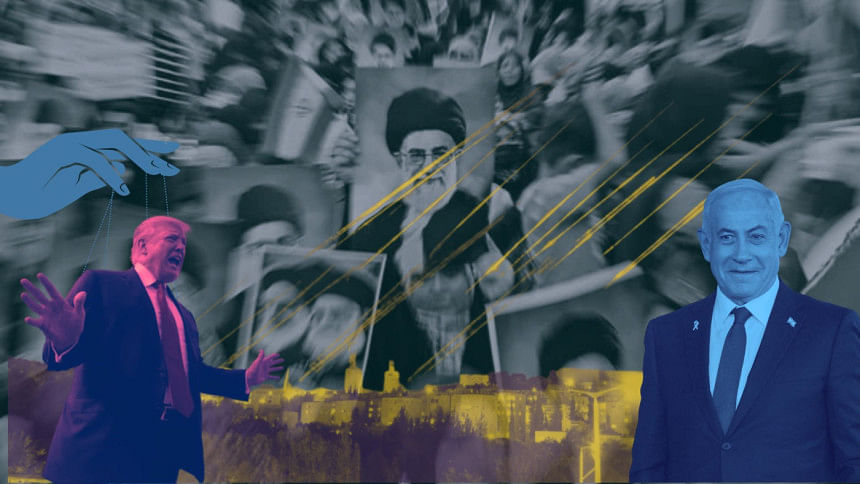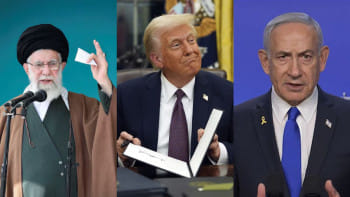Israel manipulated the US into war

On June 21, 2025, the US attacked three major nuclear sites of Iran. With these targeted strikes on Iranian nuclear facilities, the US formally joined Israel in its war against Iran. The decision, authorised by Donald Trump, may have been justified publicly under the banner of "national security," but make no mistake, it wasn't America's war. It was Israel's war, and Trump was pulled into it.
US President Trump, financially and politically tied to a foreign power, allowed that power to use American military might to settle its own scores. Though he has claimed to have achieved a ceasefire on June 24, 2025, there is long-term damage such entanglements will inflict not just on US credibility, but on its economy, military, and domestic cohesion.
Donald Trump has long branded himself as the most pro-Israel president in US history and this wasn't merely out of ideological conviction. His alignment with Israeli leadership, particularly Prime Minister Benjamin Netanyahu, has always been both strategic and transactional. Behind the scenes, wealthy pro-Israeli donors including figures like businessman and casino owner Sheldon Adelson and other major contributors to Trump-aligned Super PACs have bankrolled his political campaigns. Miriam Adelson's Preserve America PAC is claimed to be the biggest pro-Israeli spender, pouring over $215 million into US presidential elections to help Trump. These donations didn't come without expectations. In politics, influence is the return on investment.
Trump's past gestures to Israel went beyond symbolic diplomacy. During his first term, Trump moved the US embassy to Jerusalem from Tel Aviv. He recognised the annexation of the Golan Heights, and brokered the Abraham Accords to push for Israel's normalisation with Arab nations, sidelining Palestinians. He went against his Western allies and pulled the US out of the Joint Comprehensive Plan of Action, where Iran agreed to dismantle most of its nuclear programme in exchange for the relief of economic sanctions. Trump's basis was Netanyahu's presentation, claiming he obtained secret Iranian documents that showed "Iran had lied about the extent of its past nuclear weapons programme." Trump bent over backward to align US foreign policy with Netanyahu's interests that often diverged from the US.
So, when Israel launched its first strikes against Iranian targets this year, it wasn't surprising that Netanyahu backhandedly called on Trump to finish the job. The Israeli military lacked the bunker-buster bombs to strike Iran's underground nuclear facility at Fordow. Only the US could do that. It's no secret that Israel's survival strategy relies heavily on military pre-emption. What's new is how explicitly and effectively it has outsourced parts of that strategy to the US military. Israel doesn't just share intelligence with the US; it filters it. Trump's view of Iranian nuclear capabilities was shaped by Israeli briefings, crafted to create a sense of urgency and fear. Israel's strikes on Iranian military leaders reportedly also killed Ali Shamkhani, a nuclear adviser who was part of the committee for US-Iran nuclear negotiations. Israel's targets were designed not just to disable, but also to derail diplomacy.
This war wasn't inevitable, it was orchestrated. Netanyahu's public support has been collapsing dramatically with polls showing that approximately 60 percent of Israelis want him to resign. The Israeli leader saw the war with Iran as a way to shift attention and regain control. He has spent most of his political career obsessed with the threat he believes Iran poses to Israel. He has spent much of the last 15 years attempting to persuade the US that only military action could destroy Iran's nuclear weapons programme.
Trump, meanwhile, sought a win. He hadn't succeeded in ending the war in Ukraine, hadn't brokered lasting peace in Gaza, and had been humiliated by Indian Prime Minister Modi, who contradicted Trump's claims that he mediated the ceasefire with Pakistan. Netanyahu fed Trump's insatiable hunger to show his power at the right time. Striking Iran gave Trump something to brag about, a short-term "win" that MAGA media could spin.
Trump's base, primarily working-class, anti-interventionist Americans, has tolerated his "shock and awe" tactics in the past. They cheered when he took out General Qassem Soleimani. They rallied behind the idea of a quick, decisive strike. But this time is different.
This isn't a one-time strike war. This is a brewing conflict with a state that has powerful proxies, advanced missiles, and real capacity for asymmetric retaliation. Already, 40,000 US service members in the region are vulnerable. And if American blood is spilled—not in a surgical drone strike, but in missile attacks on bases or retaliatory assaults by militias in Iraq—Trump will have more than a public relations problem. He'll have to explain how "America First" somehow became "Israel First."
The costs will rise quickly. Oil prices are already climbing. A blockade of the Strait of Hormuz, even temporary, could tip the global economy into recession. Regional allies like Saudi Arabia and the UAE are nervous, not out of sympathy for Iran, but out of fear that their infrastructure could become collateral damage.
This war, if it escalates further, will not bring about regime change in Iran. If anything, US and Israeli strikes are consolidating nationalist sentiment within Iran, making diplomacy even more difficult.
Moreover, this entanglement is exposing the limits of US control. Israel continued assassinating Iranian officials, striking infrastructure, and still pushing for regime change, goals that Trump publicly denied and then embraced. It is Israel pulling him, not the other way around. The tail is wagging the dog. The war is being driven by Tel Aviv, not Washington—the superpower.
And what does the US gain? Nothing but the privilege of paying the bill.
The US is haemorrhaging its moral capital, dragging itself into another endless back-and-forth conflict, and stretching its military thin, all at the request of a "partner" who appears far more committed to its own survival than to US stability or interests. China and Russia, meanwhile, watch gleefully from the sidelines as US credibility burns.
The biggest tragedy in all this is the loss of strategic independence. The US no longer dictates the terms; Netanyahu's Israel does. In the months ahead, we may see a temporary resolution, but we may also witness more attacks, more casualties, and more pressure on Trump to "finish the job." The damage has already begun. The US is no longer acting with calculated self-interest. It is being used. If history teaches us anything, it's that wars built on manipulation don't end well for anyone.
Md Kawsar Uddin is associate professor in the Department of English and Modern Languages at the International University of Business Agriculture and Technology (IUBAT).
Views expressed in this article are the author's own.
Follow The Daily Star Opinion on Facebook for the latest opinions, commentaries and analyses by experts and professionals. To contribute your article or letter to The Daily Star Opinion, see our guidelines for submission.

 For all latest news, follow The Daily Star's Google News channel.
For all latest news, follow The Daily Star's Google News channel. 









Comments